05. 情态动词 自考补充语法 14
情态动词用法总结及相应练习

情态动词用法总结及相应练习在英语中,情态动词属于助动词。
除了作简略回答外,它们一般不能单独使用,它们必须与动词原形一起使用构成句子的谓语。
不同的情态动词会有不同的意义和用法。
有时,同一个情态动词在不同的语境中也会产生不同的含义。
下面我们将讨论这些情态动词的用法。
情态动词的推测性用法和非推测性用法情态动词一般有两种用法:推测性用法(epistemic use)和非推测性用法(non-epistemic use)。
推测性用法是指做出推测,预测事物发生的可能性;非推测性用法则指情态动词本身的基本含义,如XXX表示能力,may表示许可,must和should表示必须和义务,need 表示需要等。
例如:I can swim。
(非推测性用法)This can be true。
(推测性用法)You may go now。
(非推测性用法)He may be ill now。
(推测性用法)You must finish it before lunch time。
(非猜测性用法)He must be at home for he never goes out at dinner time。
(推测性用法)我们把英语中的9大神态动词按其猜测性和非猜测性用法列表如下:情态动词非推测性用法推测性用法can/could能力/许可(ability/n)可能(possibility)may/might许可(n)可能(possibility)will/would意愿(n)预言性(predictability)XXX责任和义务(n)应该是(logical necessity)must责任和任务(n)一定,一定(logical necessity)神态动词非猜测性用法的申明1.may和might透露表现允许may能够与分歧的人称搭配,透露表现“答应、允许”。
比方:May I know your name?You may be the first to leave if you are in a hurry。
05 情态动词和虚拟语气-2021年新高考英语二轮复习语法及题型大全 (含答案)
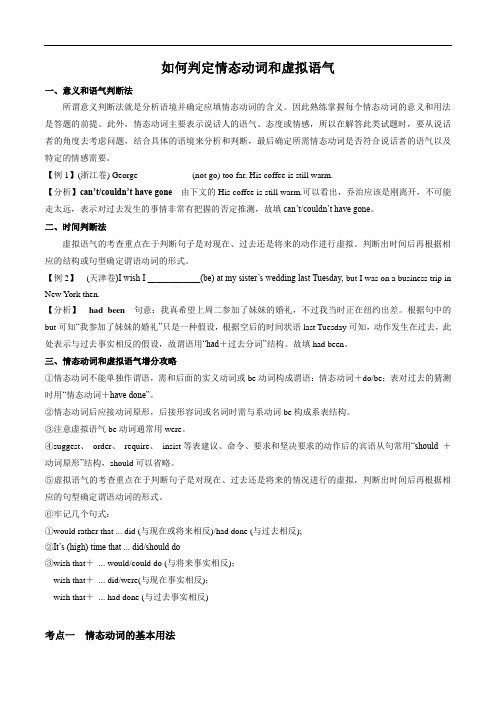
如何判定情态动词和虚拟语气一、意义和语气判断法所谓意义判断法就是分析语境并确定应填情态动词的含义。
因此熟练掌握每个情态动词的意义和用法是答题的前提。
此外,情态动词主要表示说话人的语气、态度或情感,所以在解答此类试题时,要从说话者的角度去考虑问题,结合具体的语境来分析和判断,最后确定所需情态动词是否符合说话者的语气以及特定的情感需要。
【例1】(浙江卷) George ____________(not go) too far. His coffee is still warm.【分析】can’t/couldn’t have gone由下文的His coffee is still warm.可以看出,乔治应该是刚离开,不可能走太远,表示对过去发生的事情非常有把握的否定推测,故填can’t/couldn’t have gone。
二、时间判断法虚拟语气的考查重点在于判断句子是对现在、过去还是将来的动作进行虚拟。
判断出时间后再根据相应的结构或句型确定谓语动词的形式。
【例2】(天津卷)I wish I ____________(be) at my sister’s wedding last Tuesday, but I was on a business trip in New York then.【分析】had been句意:我真希望上周二参加了妹妹的婚礼,不过我当时正在纽约出差。
根据句中的but可知“我参加了妹妹的婚礼”只是一种假设,根据空后的时间状语last Tuesday可知,动作发生在过去,此处表示与过去事实相反的假设,故谓语用“had+过去分词”结构。
故填had been。
三、情态动词和虚拟语气增分攻略①情态动词不能单独作谓语,需和后面的实义动词或be动词构成谓语:情态动词+do/be;表对过去的猜测时用“情态动词+have done”。
②情态动词后应接动词原形,后接形容词或名词时需与系动词be构成系表结构。
情态动词的用法及练习(附答案)

情态动词的用法及专项练习第1 & 2类:词形词的含义例句can ①“能力”②“允许”③“可能性”(0%)④“请求”I can speak English.Can I go to the toilet.It can’t be Susan. She is in Paris. Can you help me?could ①“过去的能力”②“过去的允许”③“可能性”(30%)④“请求”, 比can更客气⑤“建议”⑥“将来的一种可能性”She could speak English When she was 5 years old. Could I borrow your dictionary?It could get much colder in January.Could you please say that again more slowly.We could try to fix it ourselves.I think we could go to war again.be able to “能力”= can, 但比can的时态更具多样性。
can无法表达的时态,用be able to表达。
She will be able to teach English. (一般将来时)She was able to talk when she was 2 years old. (一般过去时)I would love to be able to play the piano. (动词不定式)may ①“请求、允许”(比较礼貌)②“将来的可能性”(50%)③may 在更多的时态中经常May I come in?It may rain tomorrow.第1类:十大情态动词can / could / may / might / must / ought to / shall / should / will / would 第2类:半情态词及充当情态动词的词had better / be able to / have to / used to / need / dare用be allowed to来代替might “较小的可能性”(≤30%)I might move to Canada some day.must ①“必须”(责任、义务)②“可能性”(推测) (100%)③“禁止”(否定式) Everyone must pay taxes.She didn’t arrive. She must be sick.You mustn’t p l ay with fire. It’s dangerous.have to ①“必须、不得不”(客观上不得不做)②多种时态里面代替“must”,因must只有一般现在,但have to 可以有多种时态。
高一英语语法情态动词知识点
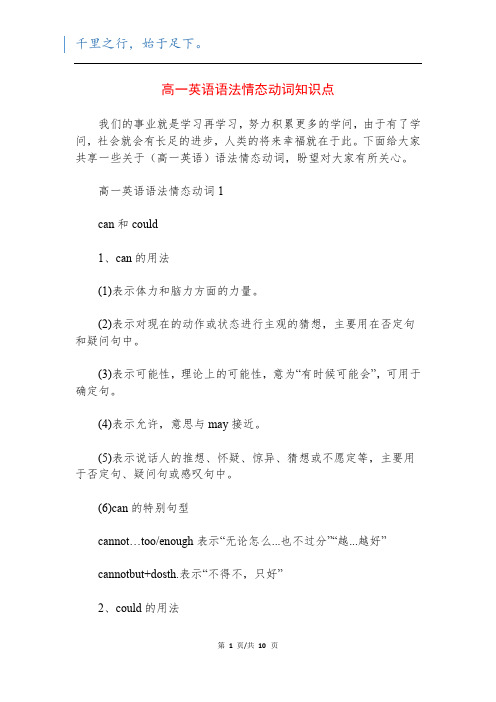
高一英语语法情态动词知识点我们的事业就是学习再学习,努力积累更多的学问,由于有了学问,社会就会有长足的进步,人类的将来幸福就在于此。
下面给大家共享一些关于(高一英语)语法情态动词,盼望对大家有所关心。
高一英语语法情态动词1can和could1、can的用法(1)表示体力和脑力方面的力量。
(2)表示对现在的动作或状态进行主观的猜想,主要用在否定句和疑问句中。
(3)表示可能性,理论上的可能性,意为“有时候可能会”,可用于确定句。
(4)表示允许,意思与may接近。
(5)表示说话人的推想、怀疑、惊异、猜想或不愿定等,主要用于否定句、疑问句或感叹句中。
(6)can的特别句型cannot…too/enough表示“无论怎么...也不过分”“越...越好”cannotbut+dosth.表示“不得不,只好”2、could的用法(1)表示力量,指的是过去时间。
(2)表示允许,指的是过去时间。
(3)表示可能,可以指过去时间,也可以指现在时间,表示语气缓和。
(4)委婉客气地提出问题或陈述看法,指的是现在时间。
主要用于疑问句,回答时用can。
3、can与could的区分can表推想时只用于否定句和疑问句(could无此限制)。
couldn’t 的可能性比can’t小。
4、can与beableto的区分(1)现在时:无区分,但后者不常用。
(2)完成时;can没有完成时,此时要用have(has,had)beenableto。
(3)将来时:can没有将来时,要用willbeableto。
(4)过去时:could表示一般力量,was/wereableto表示在详细场合通过努力胜利做成某事的力量。
高一英语语法情态动词2二、may和might1、may的用法(1)表示询问或说明一件事可不行以做。
(2)表示一件事或许会发生或某种状况可能会存在,通常用在确定句和否定句中。
留意:表示可能性时,can’t语气强,表示“不行能”,maynot语气弱,表示“可能不”。
专四英语情态动词语法考点

专四英语情态动词语法考点2018年专四英语情态动词语法考点知之者不如好之者,好之者不如乐之者。
以下是店铺为大家搜索整理的2018年专四英语情态动词语法考点,希望能给大家带来帮助!考试中,情态动词部分重点测试以下内容:(1)情态动词+行为动词完成式(2)某些情态动词的特殊用法1. must have v-edmust have v-ed 表示推测过去某事“一定”发生了。
其否定形式为:can’t / couldn’t have v-ed, 表示过去不可能发生某事。
例如:Since the ditch is full of water, it must have rained last night.2. could have v-ed 表示推测过去某动作“很可能”发生了3. may / might have v-ed 表示推测过去某事“也许”发生了.may 比 might 表示的可能性在说话人看来稍大些。
4.ought to / should have v-ed 和ought not to / shouldn’t have v-ed 用于对已发生的情况表示“责备”、“不满”,分别表示“本应该…”和“本不应该…”表示应完成而未完成的动作用于完成时中的否定句,表示不应完成但已做的动作5.needn’t have v-ed 表示过去做了某事,但没有做的'必要,意为“本没必要…”。
例如:You needn’t have waken me up; I don’t have to go to work today.注意:did not need to do 动作并没发生例:I didn’t need to get up early,so I got up until 9 a.m.*特殊用法(1) can‘t表示“不可能”,may not 表示“不可以”,mustn’t(must not) 表示“不许可禁止”,needn't (need not) 表示“不必”,dare not +动词原形表示“不敢”(2) must表推测的否定现在式用can’t ,过去式用couldn’t(3)May I / we …?这一类疑问句的肯定回答为Yes, please.或Certainly;否定回答为Please don’t.或No, you mustn’t. 例如:“May we leave now?” “No, you mustn’t. You haven’t finished your home work yet.”(4) need I / we …?这一类疑问句的肯定回答为Yes, we must; 否定回答为needn’t(5)在回答must引起的问题时,如果是否定的答复,不能用mustn’t,而要用needn’t或don’t have to(6)May/might as well may……but….(表转折)(7) I wish to go home with you, may I?(8) Do help yourself to have fruit, won’t you/ will you? (表示一种委婉的请求)*情态动词短语的使用would like to do…would rather do…would rather + 从句would prefer to do...had better do...*情态动词: will(愿意), shall(将), must(必须), can, may, would, should(应该), might, could, ought to, used to(过去常常), need(需要), dare(竟敢),have to(不得不)*dare, need 也可作一般(行为)动词*情态动词一般用法的否定:mustn’t 不准, 禁止,不要can’t(couldn’t) 不会;不能;may (might) not 不可以;needn’t 没必要( = don’t have to )used not/usedn’t to或didn’t use to… 过去不…dare not 不敢*情态动词推测用法Must 一定,肯定can’t (couldn’t) 不可能Can/ could 可能Can’t (couldn’t) 不可能may/ might “可能,也许” May (might) not 也许不,可能不*推断用法should/ought to“按理应当,应该是; shouldn’t 不应该( = ought not to )*情态动词+have +done结构表示对过去动作的推测1. must have done:对过去的肯定推测,译作“一定做了…”,只能用于肯定句中。
(完整版)情态动词用法及其练习与答案
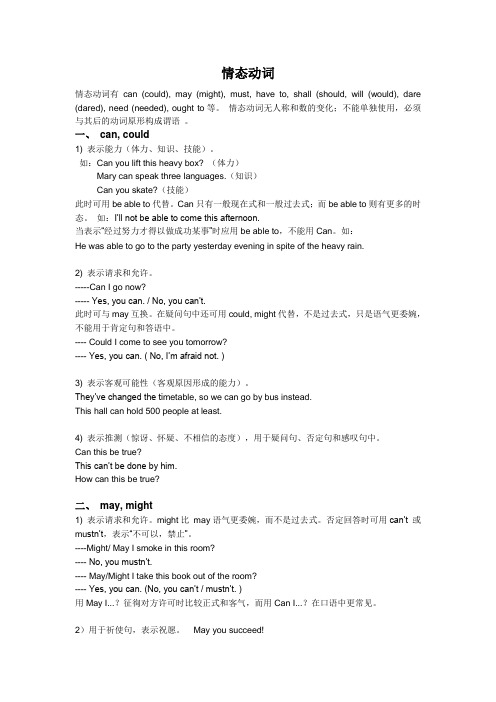
情态动词情态动词有can (could), may (might), must, have to, shall (should, will (would), dare (dared), need (needed), ought to等。
情态动词无人称和数的变化;不能单独使用,必须与其后的动词原形构成谓语。
一、can, could1) 表示能力(体力、知识、技能)。
如:Can you lift this heavy box? (体力)Mary can speak three languages.(知识)Can you skate?(技能)此时可用be able to代替。
Can只有一般现在式和一般过去式;而be able to则有更多的时态。
如:I’ll not be able to come this afternoon.当表示“经过努力才得以做成功某事”时应用be able to,不能用Can。
如:He was able to go to the party yesterday evening in spite of the heavy rain.2) 表示请求和允许。
-----Can I go now?----- Yes, you can. / No, you can’t.此时可与may互换。
在疑问句中还可用could, might代替,不是过去式,只是语气更委婉,不能用于肯定句和答语中。
---- Could I come to see you tomorrow?---- Yes, you can. ( No, I’m afraid not. )3) 表示客观可能性(客观原因形成的能力)。
They’ve changed the ti metable, so we can go by bus instead.This hall can hold 500 people at least.4) 表示推测(惊讶、怀疑、不相信的态度),用于疑问句、否定句和感叹句中。
完整word版初中英语语法专题 情态动词

初中英语语法专题情态动词一、【情态动词】又叫情态助动词。
它们具有以下特点:⑴它们必须与其他动词连用,即:情态动词+动词原形表示说话人对所述动作的看法,如需要、可能、意愿或怀疑等。
⑵绝大多数情态动词没有人称和数的变化,即第三人称单数不加-s(以be和have 开头的情态动词短语除外)。
⑶在意义上,情态动词具有“多义性”。
例:can既可表示能力,又可表示可能、允许等意义。
有can (could), may (might), must, have to, shall (should, will (would), dare (dared), need (needed), ought to等。
情态动词无人称和数的变化;不能单独使用,必须与其后的动词原形构成谓语。
^^can 表示能力,意为“能会”表示推测,意为“可能”,常用于否定句和疑问句中表示请求,允许,意为“可以”.^^could 是can 的过去式,意为“能、会”,表示过去的能力在疑问句中表示委婉请求 .^^may 表示请求、许可,意为“可以”表示推测,常用于肯定句中,意为“可能、也许”. ^^might 是may的过去式,表推测,常用于肯定句中,意为“可能、也许” .^^must 表示主观看法,意为“必须、应该”表有把握的推测,用语肯定句 .^^need \表示需要、必须,主要用于否定句和疑问句中 .^^dare 表示敢于,主要用于否定句和疑问句中.^^should 意为“应该”,表示要求和命令表示劝告、建议.^^had better 意为“最好”,表示建议.^^used to意为“过去常常,表示过去的动作、行为.部分情态动词的基本用法:考点一情态动词知识清单1. can的基本用法:⑴表示体力或智力上的能力,即“能够,会”,可与be able to转换。
例:He can speak English. = He is able to speak English.—Can you play basketball?— No, I can't.如果表示将来具备的能力,要用will be able to。
情态动词英语语法知识精讲
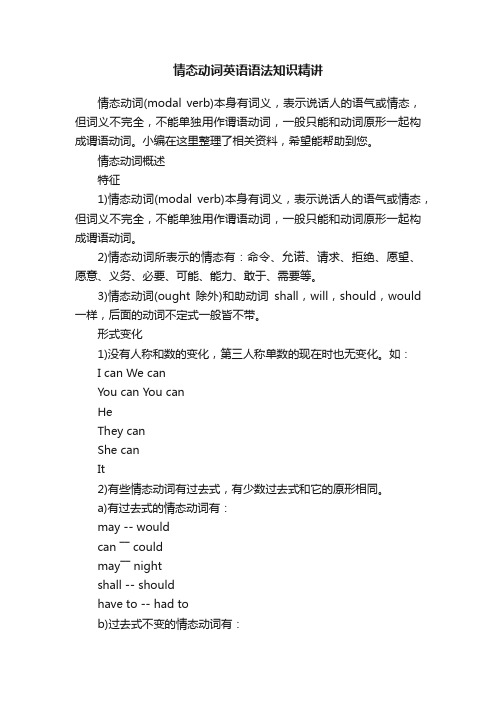
情态动词英语语法知识精讲情态动词(modal verb)本身有词义,表示说话人的语气或情态,但词义不完全,不能单独用作谓语动词,一般只能和动词原形一起构成谓语动词。
小编在这里整理了相关资料,希望能帮助到您。
情态动词概述特征1)情态动词(modal verb)本身有词义,表示说话人的语气或情态,但词义不完全,不能单独用作谓语动词,一般只能和动词原形一起构成谓语动词。
2)情态动词所表示的情态有:命令、允诺、请求、拒绝、愿望、愿意、义务、必要、可能、能力、敢于、需要等。
3)情态动词(ought除外)和助动词shall,will,should,would 一样,后面的动词不定式一般皆不带。
形式变化1)没有人称和数的变化,第三人称单数的现在时也无变化。
如:I can We canYou can You canHeThey canShe canIt2)有些情态动词有过去式,有少数过去式和它的原形相同。
a)有过去式的情态动词有:may -- wouldcan ―― couldmay―― nightshall -- shouldhave to -- had tob)过去式不变的情态动词有:must - must (或had to)ought to - ought toneed---needdare - dare(亦可用dared)3)大多数情态动词后面可用动词的进行式、完成式和被动形式,如:can(may,must)be doing,can(may,must) have done,can(may,must)be done等。
否定式情态动词和助动词一样,后面可直接跟否定词not。
现将情态动词的否定式及其否定式的简略式(简略式用于口语中)列举如下:shall not--shan't [FB:nt]will not---won't [wEunt]can not-can't [kB:nt]must not-mustn't [5mQsnt]should not-- shouldn'twould not-- wouldn'tcould not-- couldn'tdare not- daren't [dZEnt]need not-- needn't在疑问句中的用法情态动词在疑问句中的用法和助动词相同。
自考现代英语语法重点
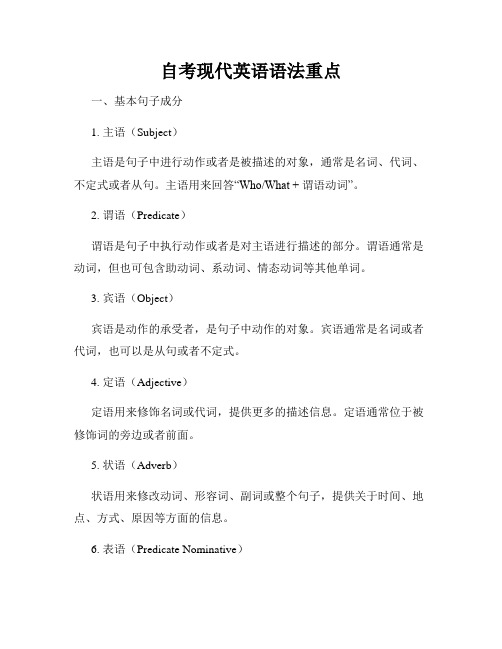
自考现代英语语法重点一、基本句子成分1. 主语(Subject)主语是句子中进行动作或者是被描述的对象,通常是名词、代词、不定式或者从句。
主语用来回答“Who/What + 谓语动词”。
2. 谓语(Predicate)谓语是句子中执行动作或者是对主语进行描述的部分。
谓语通常是动词,但也可包含助动词、系动词、情态动词等其他单词。
3. 宾语(Object)宾语是动作的承受者,是句子中动作的对象。
宾语通常是名词或者代词,也可以是从句或者不定式。
4. 定语(Adjective)定语用来修饰名词或代词,提供更多的描述信息。
定语通常位于被修饰词的旁边或者前面。
5. 状语(Adverb)状语用来修改动词、形容词、副词或整个句子,提供关于时间、地点、方式、原因等方面的信息。
6. 表语(Predicate Nominative)表语是指位于系动词之后,对主语进行补充说明、描述其身份、属性、状态等的一部分。
7. 同位语(Appositive)同位语用来进一步解释或说明前面的名词或代词,放在被解释的名词或代词的旁边。
8. 补语(Complement)补语用来补充或完善动词、名词、形容词等的意义,通常放在被补充词的后面。
二、句子结构1. 简单句(Simple Sentence)简单句是由一个主语和一个谓语构成的句子。
它可以有其他成分(如宾语、定语、状语等),但是只有一个主谓结构。
2. 并列句(Compound Sentence)并列句是由两个或多个简单句通过连词(如and、but、or、for等)连接而成的句子。
3. 复合句(Complex Sentence)复合句由一个主句和一个或多个从句构成。
主句可以独立成句,而从句不能独立成句。
4. 复合并列句(Compound-Complex Sentence)复合并列句是由两个或多个主句和一个或多个从句构成的句子。
三、动词形式1. 一般现在时(Simple Present)一般现在时用来表示经常性的动作、事实或习惯。
情态动词英语语法知识点汇总
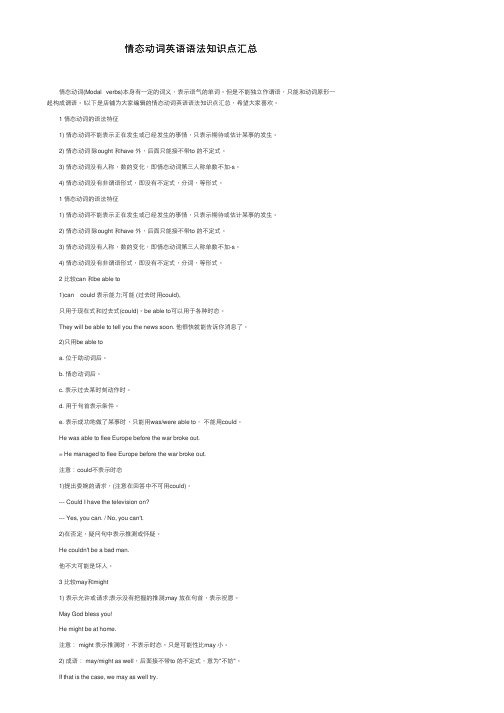
情态动词英语语法知识点汇总情态动词(Modal verbs)本⾝有⼀定的词义,表⽰语⽓的单词。
但是不能独⽴作谓语,只能和动词原形⼀起构成谓语。
!以下是店铺为⼤家编辑的情态动词英语语法知识点汇总,希望⼤家喜欢。
1 情态动词的语法特征1) 情态动词不能表⽰正在发⽣或已经发⽣的事情,只表⽰期待或估计某事的发⽣。
2) 情态动词除ought 和have 外,后⾯只能接不带to 的不定式。
3) 情态动词没有⼈称,数的变化,即情态动词第三⼈称单数不加-s。
4) 情态动词没有⾮谓语形式,即没有不定式,分词,等形式。
1 情态动词的语法特征1) 情态动词不能表⽰正在发⽣或已经发⽣的事情,只表⽰期待或估计某事的发⽣。
2) 情态动词除ought 和have 外,后⾯只能接不带to 的不定式。
3) 情态动词没有⼈称,数的变化,即情态动词第三⼈称单数不加-s。
4) 情态动词没有⾮谓语形式,即没有不定式,分词,等形式。
2 ⽐较can 和be able to1)can could 表⽰能⼒;可能 (过去时⽤could),只⽤于现在式和过去式(could)。
be able to可以⽤于各种时态。
They will be able to tell you the news soon. 他很快就能告诉你消息了。
2)只⽤be able toa. 位于助动词后。
b. 情态动词后。
c. 表⽰过去某时刻动作时。
d. ⽤于句⾸表⽰条件。
e. 表⽰成功地做了某事时,只能⽤was/were able to,不能⽤could。
He was able to flee Europe before the war broke out.= He managed to flee Europe before the war broke out.注意:could不表⽰时态1)提出委婉的请求,(注意在回答中不可⽤could)。
--- Could I have the television on?--- Yes, you can. / No, you can't.2)在否定,疑问句中表⽰推测或怀疑。
高考英语情态动词语法专题训练及答案(完整版)
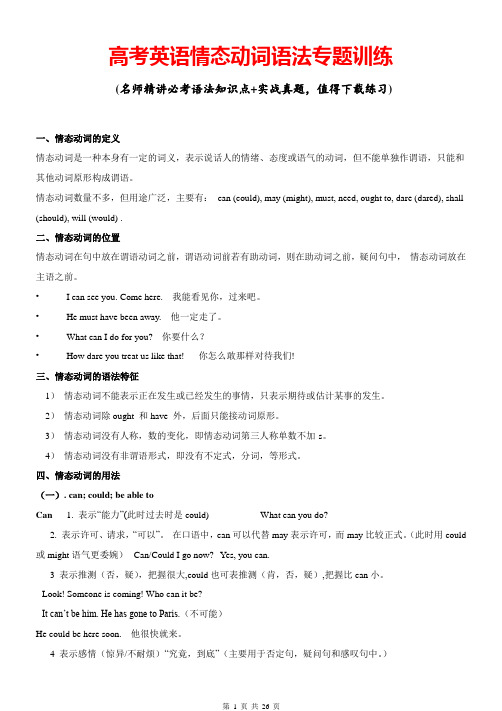
高考英语情态动词语法专题训练(名师精讲必考语法知识点+实战真题,值得下载练习)一、情态动词的定义情态动词是一种本身有一定的词义,表示说话人的情绪、态度或语气的动词,但不能单独作谓语,只能和其他动词原形构成谓语。
情态动词数量不多,但用途广泛,主要有:can (could), may (might), must, need, ought to, dare (dared), shall (should), will (would) .二、情态动词的位置情态动词在句中放在谓语动词之前,谓语动词前若有助动词,则在助动词之前,疑问句中,情态动词放在主语之前。
•I can see you. Come here. 我能看见你,过来吧。
•He must have been away. 他一定走了。
•What can I do for you? 你要什么?•How dare you treat us like that! 你怎么敢那样对待我们!三、情态动词的语法特征1)情态动词不能表示正在发生或已经发生的事情,只表示期待或估计某事的发生。
2)情态动词除ought 和have 外,后面只能接动词原形。
3)情态动词没有人称,数的变化,即情态动词第三人称单数不加-s。
4)情态动词没有非谓语形式,即没有不定式,分词,等形式。
四、情态动词的用法(一). can; could; be able toCan 1. 表示“能力”(此时过去时是could) What can you do?2. 表示许可、请求,“可以”。
在口语中,can可以代替may表示许可,而may比较正式。
(此时用could 或might语气更委婉)--Can/Could I go now?--Yes, you can.3 表示推测(否,疑),把握很大,could也可表推测(肯,否,疑),把握比can小。
--Look! Someone is coming! Who can it be?--It can’t be him. He has gone to Paris.(不可能)He could be here soon. 他很快就来。
高考英语极简语法思维导图与提升专练:第十四章 情态动词例句练习及答案

【第十四章情态动词例句】养成良好的答题习惯,是决定成败的决定性因素之一。
做题前,要认真阅读题目要求、题干和选项,并对答案内容作出合理预测;答题时,切忌跟着感觉走,最好按照题目序号来做,不会的或存在疑问的,要做好标记,要善于发现,找到题目的题眼所在,规范答题,书写工整;答题完毕时,要认真检查,查漏补缺,纠正错误。
总之,在最后的复习阶段,学生们不要加大练习量。
在这个时候,学生要尽快找到适合自己的答题方式,最重要的是以平常心去面对考试。
一、例句1.can/couldHe can’t be sixty.Could you come again tomorrow?2.may/mightMay/Might I use your bike?He may/might be at home.May you succeed!3.mustYou must study hard.She must be tired.4.have toWithout help, I had to do it myself.5.ought toYou ought to obey laws.6.ShallShall we go now?The sigh there reads, “No person shall smoke here.”7.shouldYou should learn from each other.You should have given him help.8.will/wouldHe promised he would never smoke again.Will/Would you like some tea?9.dareHe dare not/daren’t sleep alone.Dare you touch it?10.needYou needn’t do the work now.ed toHe used to play football.【情态动词练习】1. It used to be that you ________ drive for miles here without seeing another person, but now there are houses and people everywhere.A. needB. shouldC. couldD. must2.Jim says we ________ stay in his house as long as we leave it clean and tidy .A. mustB. canC. needD. should3. If I hadn't been faced with so many barriers, I ________ where I am.A. won't beB. wouldn't have beenC. wouldn't beD. shouldn't have been4.The professor warned the students that on no account ________ use mobile phones in his class.A. should theyB. they shouldC. dare theyD. they dare5. What a pity! You missed the sightseeing, or we ________ a good time together.A. hadB. will haveC. would have hadD. had had6.The workers were not better organized, otherwise they ________ the task in half the time.A. accomplishedB. had accomplishedC. would accomplishD. would have accomplished7. I can't find my purse. I ________ it in the supermarket yesterday, but I'm not sure.A. should leaveB. must have leftC. might leaveD. could have left8.It’s strange that he ________ have taken the books without the owner’s permission.A. wouldB. shouldC. couldD. might9. There is a good social life in the village, and I wish I ________ a second chance to become more involved.A. hadB. will haveC. would have hadD. have had10. In today’s information age, the loss of data ________ cause serious problems for a company.A. needB. shouldC. canD. must11.Thank you for all your hard work last week. I don’t think we ________ it without you.A. can manageB. could have managedC. could manageD. can have managed12. Samuel, the tallest boy in our class, ________ easily reach the books on the top shelf.A. mustB. shouldC. canD. need13. My room is a mess, but I ________ clean it before I go out tonight. I can do it in the morning.A. daren’tB. shouldn’tC. needn’tD. mustn’t14. —Do you have Betty’s phone number?—Yes. Otherwise, I ________ able to reach her yesterday.A.hadn’t beenB. wouldn’t have beenC. weren’tD. wouldn’t be15. It was really annoying; I ________ get access to the data bank you had recommended.A. wouldn’tB. couldn’tC. shouldn’tD. needn’t16. Had the governments and scientists not worked together , AIDS-related deaths ________ since their highest in 2005.A. had not fallenB. would not fallC. did not fallD. would not have fallen17. George ________ too far. His coffee is still warm.A. must have goneB. might have goneC. can't have goneD. needn't have gone18. I love the weekend, because I ________ get up early on Saturdays and Sundays.A. needn’tB. mustn’tC. wouldn’tD. shouldn’t19. I ________ have worried before I came to the new school, for my classmates here are very friendly to me.A. mightn’tB. mustn’tC. needn’tD. couldn’t20. You ________ be careful with the camera. It costs!A. mustB. mayC. canD. will21. —Sorry, Mum! I failed the job interview again.—Oh, it's too bad. You ________ have made full preparations.A. mustB. canC. wouldD. should22. You ________ feel all the training a waste of time, but I’m a hundred percent sure later you’ll be grateful you did it.A. shouldB. needC. shallD. may23. You ________ be Carol. You haven’t changed a bit after all these years.A. mustB. canC. willD. shall24. It was so noisy that we ________ hear ourselves speak.A. couldn’tB. shouldn’tC. mustn’t D needn’t25.—Can’t you stay a little longer?—It’s getting late. I really ________ go now. My daughter is home alone.A .mayB .can C. must D .dare【情态动词答案】1-5 CBCAC 6-10 DDBAC 11-15 BCCBB 16-20 DCACA 21-25 DDAAC高考质量提升是一项系统工程,涉及到多个方面、各个维度,关键是要抓住重点、以点带面、全面突破,收到事半功倍的效果。
00015自考英语(二)核心知识备考手册
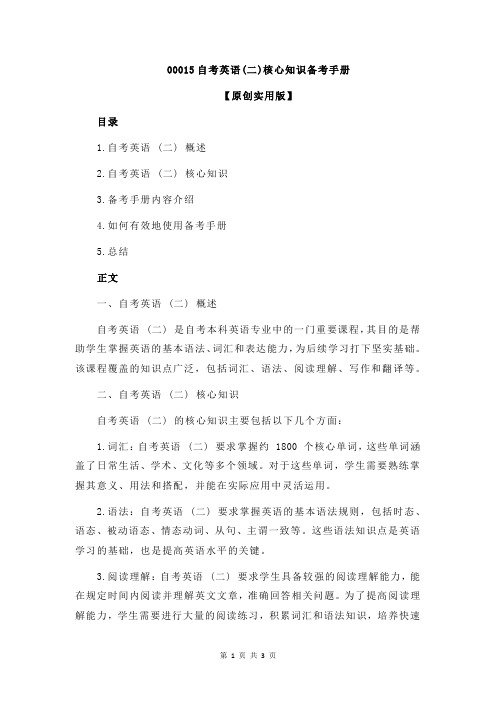
00015自考英语(二)核心知识备考手册【原创实用版】目录1.自考英语 (二) 概述2.自考英语 (二) 核心知识3.备考手册内容介绍4.如何有效地使用备考手册5.总结正文一、自考英语 (二) 概述自考英语 (二) 是自考本科英语专业中的一门重要课程,其目的是帮助学生掌握英语的基本语法、词汇和表达能力,为后续学习打下坚实基础。
该课程覆盖的知识点广泛,包括词汇、语法、阅读理解、写作和翻译等。
二、自考英语 (二) 核心知识自考英语 (二) 的核心知识主要包括以下几个方面:1.词汇:自考英语 (二) 要求掌握约 1800 个核心单词,这些单词涵盖了日常生活、学术、文化等多个领域。
对于这些单词,学生需要熟练掌握其意义、用法和搭配,并能在实际应用中灵活运用。
2.语法:自考英语 (二) 要求掌握英语的基本语法规则,包括时态、语态、被动语态、情态动词、从句、主谓一致等。
这些语法知识点是英语学习的基础,也是提高英语水平的关键。
3.阅读理解:自考英语 (二) 要求学生具备较强的阅读理解能力,能在规定时间内阅读并理解英文文章,准确回答相关问题。
为了提高阅读理解能力,学生需要进行大量的阅读练习,积累词汇和语法知识,培养快速阅读和理解的能力。
4.写作:自考英语 (二) 要求学生具备良好的写作能力,能在规定时间内根据题目要求撰写高质量的英文文章。
为了提高写作能力,学生需要进行大量的写作练习,积累词汇和语法知识,培养逻辑思维和表达能力。
5.翻译:自考英语 (二) 要求学生具备一定的英汉互译能力,能在规定时间内准确地将英文句子翻译成中文或中文句子翻译成英文。
为了提高翻译能力,学生需要进行大量的翻译练习,积累词汇和语法知识,培养对语言的敏感度和翻译技巧。
三、备考手册内容介绍备考手册是自考英语 (二) 学习的重要辅助工具,主要包括以下内容:1.知识点梳理:备考手册对自考英语 (二) 的核心知识点进行了梳理,帮助学生明确学习重点,便于有针对性地进行复习。
2023年自考英语

语法情态动词英语的情态动词(model verb)重要有can (could), may(might), must, ought, need, dare等。
此外,shall, will, should, would在一定场合也可用作情态动词。
情态动词的特点是它有一定的词义,但通常需同另一个动词一起构成谓语。
它在各种人称后都用同样的形式。
除ought跟不定式外,其他情态动词都跟动词原形(即不带to的不定式)构成谓语。
有时也跟动词的完毕形式和进行形式构成谓语。
ought + to do一、can/could1.表达能力。
be able to例如:The theatre can seat 1,500 people.这座剧院可以容纳1500人。
When she was young, she could sing very well. 当她年轻的时候她唱歌唱的很好。
2.表达也许性。
Possibility例如:You can meet him at the college sometimes. 有的时候你在学校里可以看到他。
At that time few people could go abroad. 在那个时候很少有人也许出国。
3.表达允许。
mayCan I go now? Yes, you can. 我现在可以去吗?你现在可以去。
Peter asked his teacher whether he could ask for a leave. 比特问他的老师他是否能请天假。
Could 用法1.could用于比较委婉地提出请求、疑问或见解。
这种用法是一个独立的情态动词,而不是can的过去式。
这种用法在时态上与can没有差别。
2.could一般多用于疑问句而不用于肯定句。
3.回答要用can。
例如:-Could you lend me your bicycle? 可不可以把你的自行车借给我?-Yes, I can. / Sorry, I can't.二、may/might1.表达允许 can例如:You may return the book to the library next Monday. 你可以下周一把书归还给图书馆。
成考情态动词

2、第二、三人称陈述句中表示义务“应该” You should follow the laws.
2、shall/should ought to
+ have +p.p
表示本应该做而未做。
Eg. You should have been five minutes ago.
need的用法
1.need 作情态动词主要用于问句和否定句中,意为“必要”。 2. need开头的疑问句,肯定回答用must,否定回答用needn't
1.--Look! The man at the gate ___ be our headmaster. He is always standing there every morning
--No, it __C_ be him. He is holding a meeting in the office now. 表示 “一定”时用于肯定句,否定时用can't
A.Must B.Shall C.Will D.Would
2.Go and ask Mr Liu.He ___A______tell you.
A.may B.can C.would D.could
3._____B____you please tell me the time please?
A.Shall B.Will C.May D.Might
A.Will B.Could C.Must D.Would
➢ 课时训练
6.He said Kate __B___come to the party.But I don't think so.
A.could
B.might C.need
D.must
高考英语极简语法思维导图与提升专练:第十四章 情态动词

used to
需要、必须(常用于否定句和疑问中)
need
敢(常用语否定句、疑问句和条件状语从句中)
dare
表意志或决心;疑问句中用于第二 人称表请求(would比较委婉)
will/would
表建议或劝告,意为“应该”、本该(含有责备意味) ;竟然
should
用于一、三人称的疑问句,表征询意见;用于二、三人 称,表示许诺、命令、警告或表示说话人的决心等
shall
情态动词
can/could
表许可(和may可互换)、能力;表怀疑、猜测、可能性(用于否 定和疑问句中),could可表比can更委婉的语气及用于虚拟语气
may/might
表许可(问句中表请求,might更委婉);表可能、或许、猜 测(might语气更加不肯定);表祝愿(用于倒装句中)
must
表必须、应该(表主观要求);表推测 (用于肯定句),意为“准是、一定”
have to
只好,不得不(客观的必须)
ought to
应当(CEggCgAJJAARgCQQnCCEMQkBCAAAoGQAAMoAAASQFABAA=}#}
2019年自考英语(一)语法详解:情态动词

2019年自考英语(一)语法详解:情态动词情态动词的定义:情态动词是一种本身有一定的词义,表示说话人的情绪,态度或语气的动词,但不能单独作谓语, 只能和其他动词原形构成谓语。
We can be there on time tomorrow.我们明天能按时去那儿。
May I have your name?我能知道你的名字吗?Shall we begin now?我们现在就开始吗?You must obey the school rules.你必须遵守校规。
情态动词数量不多,但用途广泛,主要有下列:can (could), may (might), must, need, ought to, dare (dared), shall (should), will (would) .情态动词的位置:情态动词在句中放在谓语动词之前, 谓语动词前若有助动词,则在助动词之前,疑问句中, 情态动词则在主语之前。
I can see you. Come here.我能看见你,过来吧。
He must have been away.他一定走了。
What can I do for you?你要什么?How dare you treat us like that!你怎能那样对待我们!情态动词的特点:情态动词无人称和数的变化, 情态动词后面跟的动词需用原形,否定式构成是在情态动词后面加 "not"。
个别情态动词有现在式和过去式两种形式, 过去式用来表达更加客气, 委婉的语气, 时态性不强, 可用于过去,现在或将来。
He could be here soon.他很快就来。
We can't carry the heavy box.我们搬不动那箱子。
I'm sorry I can't help you.对不起,我帮不上你。
情态动词的用法:can (could) 表示说话人能,能够,同意,准许,以及客观条件许可,could 为 can 的过去式。
全国英语等级考试语法知识点一览

全国英语等级考试语法知识点一览全国英语等级考试语法知识点有哪些需要考生朋友们注意的呢?下面是小编为大家整理的全国英语等级考试语法知识点,仅供参考,喜欢可以收藏与分享哟!全国英语等级考试语法知识点情态动词情态动词有can (could), may (might), must, have to, shall (should, will (would), dare (dared), need (needed), ought to等。
情态动词无人称和数的变化;不能单独使用,必须与其后的动词原形构成谓语。
这里有介绍情态动词的语法特征,比较can 和be able to,may和might等的用法。
分词英语上的分词分为现在分词和过去分词。
现在分词和过去分词主要差别在于:现在分词表示“主动和进行”,过去分词表示“被动和完成”(不及物动词的过去分词不表示被动,只表示完成)。
分词可以有自己的状语、宾语或逻辑主语等。
小编为你整理了分词作为定语、状语的用法。
虚拟语气虚拟语气用来表示说话人的主观愿望或假想,所说的是一个条件,不一定是事实,或与事实相反。
条件句可分为两类,一类为真实条件句,一类为非真实条件句。
非真实条件句表示的是假设的或实际可能性不大的情况,故采用虚拟语气。
名词性从句在句子中起名词作用的句子叫名词从句 (Noun Clauses)。
名词从句的功能相当于名词词组, 它在复合句中能担任主语、宾语、表语、同位语、介词宾语等,因此根据它在句中不同的语法功能,名词从句又可分别称为主语从句、宾语从句、表语从句和同位语从句。
动名词动名词是一种兼有动词和名词特征的非限定动词。
它可以支配宾语,也能被副词修饰。
动名词有时态和语态的变化。
动词的ing形式如果是名词,这个词称动名词。
动名词具有名词的性质,因此在句中可以作主语、表语、宾语、定语等。
全国英语等级考试提分攻略一、做好最后时间安排考试迫在眉睫,如何利用好这两天做最后的冲刺很重要。
自考英语(一)英语语法基础:情态动词

自考英语(一)英语语法基础:情态动词情态动词的定义:情态动词是一种本身有必然的词义,表示说话人的情绪,态度或语气的动词,但不能单独作谓语, 只能和其他动词原形构成谓语。
We can be there on time tomorrow.我们明天能按时去那儿。
May I have your name?我能知道你的名字吗?Shall we begin now?我们现在就开始吗?You must obey the school rules.你必需遵守校规。
情态动词数量不多,但用途广泛,主要有下列:can (could), may (might), must, need, ought to, dare (dared), shall (should), will (would) .情态动词的位置:情态动词在句中放在谓语动词之前, 谓语动词前若有助动词,则在助动词之前,疑问句中, 情态动词则在主语之前。
I can see you. Come here.我能看见你,过来吧。
He must have been away.他必然走了。
What can I do for you?你要什么?How dare you treat us like that!你怎能那样对待我们!情态动词的特点:情态动词无人称和数的变化, 情态动词后面跟的动词需用原形,否定式构成是在情态动词后面加“not”。
个别情态动词有现在式和过去式两种形式, 过去式用来表达更加客气, 委婉的语气, 时态性不强, 可用于过去,现在或将来。
He could be here soon.他很快就来。
We can’t carry the heavy box.我们搬不动那箱子。
I’m sorry I can’t help you.对不起,我帮不上你。
情态动词的用法:can (could) 表示说话人能,可以,同意,准许,以及客不雅条件许可,could 为can 的过去式。
- 1、下载文档前请自行甄别文档内容的完整性,平台不提供额外的编辑、内容补充、找答案等附加服务。
- 2、"仅部分预览"的文档,不可在线预览部分如存在完整性等问题,可反馈申请退款(可完整预览的文档不适用该条件!)。
- 3、如文档侵犯您的权益,请联系客服反馈,我们会尽快为您处理(人工客服工作时间:9:00-18:30)。
情 态 动 词
be to 表示上帝、命运、官方安排;决定、命令或注定要发生的事 be going to 表示打算或看样子要发生 be about to, be on the point of 正要;正准备;马上就;常与表示突然的when连用,但不与将来时 间连用 be able/bound/likely /sure, etc. to 时态变化及用法上和普通动词完全相同 happen/ seem /tend, etc. to 只是其词义接近某些情态动词 would (very much) like/love to 很想 used to 过去常常做某事 have to 有时态变化,口语中常用have got to ought to 应该,应当;相比一定,照说应该
√
√
√
√
√ √
情 态 动 词
情态动词与完成时连用: 1.may have done 表示谈论过去的某种可能性,而这种可能性现在还存在,译 为“或许已经” 。 另:用于肯定句、否定句,但不用于疑问句。 2. might have done 表示谈论过去的某种可能性,表示“本来可能,简直可以” 。 另:不是很有把握,且可以用于疑问句。 3.can’t have done 表示推测过去动作“不可能或一定没有”发生。 另:一般多用于疑问句、否定句,但不用于肯定句 。 4.could have done 表示过去可能做的事而没有做;委婉的批评; 另:否定式表示过去不大可能发生的事。
√
19. When I consider how talented he is as a painter, I cannot help _____ that the public will appreciate his gift. A. but believing B. but believe C. believe D. to believe
√
10. The electric shaver _____ before it can be used. A. needs repairing B. should be in repair C. has to be repairable D. must repair
√
√
11. Just when we were ready to go away for the holidays, the baby _____ catch measles. A. must B. need C. can D. may 12. Don’t you really believe that such men _____ be got rid of? A. must B. should C. ought to D. need
情 态 动 词
5.would have done 表示过去会发生的而未发生,用于虚拟语气的过去时。(译 为“本会,但未” ) ☆ would like to have done 表示过去希望做……但未做 6.should have done 用于过去应该做而实际没有做的事(译为“本应该”); 在指定的某时间之前应该完成的事(译为“应该”); 暗含责备、抱怨、或遗憾之意; 用于否定句表示过去不应该做的事而做了。 7.ought to have done 表示过去应该做而没有做的事。相当于should have done。 (译为“本应该”)
Modal Verb
核心情态动词
边缘情态动词 情态动词+现在完成时
Modal Verb
核心情态动词: must 一定,必须,得(它还可能用于被动结构,间或用 于进行时态)(表必须立即,将不得不)干嘛偏要, 硬要(指做令人不快的事) can (could) 能(表能力)可能(表可能性)会(指一时的情况)可以 (表允许)可能,能够(用在疑问句或否定句中表示 惊异) may (might) 可以(表允许)可能会,也许会(表可能性)用在一些 状语从句中(表目的的状语从句或让步状语从句) shall (should)按理应当,估计(表一种估计的情况) will (would)
1. I'm awfully sorry, but I had no alternative. I simply (887) what I did. A.ought to have done B. have to do C. had to do D. must do 2. A foreign language like English is difficult to learn, so you (911-6) work too hard. A. should B. mustn't C. can't D. ought to 3. If yon don't like to swim, you (951) stay at home. A.should as well B. may as well C.can as well D. would as well 4. Sir Dennis, who is 78, has made it known that much of his collection (966) to the nation. A.had left B. is to leave C.leaves D. is to be left 5. As teachers we should concern ourselves with what is said, not what we think (976) . A. ought to be said B.must say C. have to be said D. need to say 6. It was very kind of you to do the washing-up, but you (986) it. A.didn't have to do B. wouldn’t have done C.mightn't have done D. mustn’t have done
√
20. His appearance has changed so much that you _____ not recognize him. A. can B. may C, can help D. may well
√
Modal Verb
边缘情态动词: need(仅用于疑问、否定和条件句中) dare(仅用于疑问、否定和条件句中;有时用过去式形式) (这两个词既可能做作情态动词,也可能做实义动词) had better, had best (最好) should/ought to know better than 应该懂得不宜 cannot help but 不能不,只能 cannot …too(over) 随便怎么也不过分 ,越…越好 can /may very well 完全能,可以 may/might (just) as well 不妨
√
E X E R C I S E
13. Because Oriental ideas of woman’s subordination to man prevailed in those days, she _____ meet with men on an equal basis. A. did not dared B. dared not C. dared not D. did dare not to
E X E R C I S E
1. _____ you recollect what your father’s Christian name was? A. Mustn’t B. Can’t C. Needn’t D. Shouldn’t 2. The play began at eight, so they _____ dine at seven. A. may B. must C. ought to D. should 3. As the situation stands, the book _____ be finished by the end of the month. A. will B. must B. might D. shall 4. He swore that, come what _____, he would never let her know what he was doing for her sake. A. may B. should C. ought to D. can
√
E X E R C I S E
9. We needn’t get ready yet; the guests _____ come for another hour because the due time is ten o’clock. A. needn’t B. shouldn’t C. mustn’t D. dare not
√
7. However much they _____ desire it they cannot express their sympathetic feeling. A. can B. may C. must D. will
√
8. _____ you worry her with questions, just when she is busy cooking dinner? A. Can B. May C. Must D.Will
√ √ √√E来自X E R C I S E5. She was nearly grown up and _____ soon be looking after herself. A. should B. will C. must D. can
√
6. Our house is on the top of the hill, and in winter the winds ____ be pretty cold. A. must B. ought to C. can D. need
